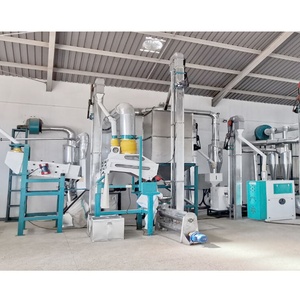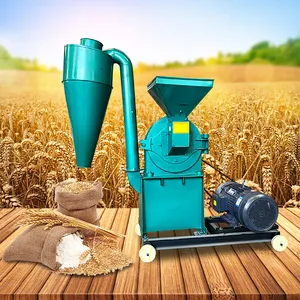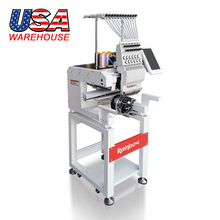What is Maize Milling Machine For Home Use
Maize milling machines are equipment designed to process maize into various products, ranging from basic maize flour and grits to more complex items such as maize meal and polenta. These machines are tailored for use in a wide array of settings, including small-scale home use, larger household needs, or commercial production environments. They serve an essential role in food processing, enabling the transformation of maize kernels into food products that can be easily consumed or further processed into other forms.
The principle behind maize milling machines involves the separation of the starchy inner part of the maize kernel (endosperm) from its outer layer (bran) and the germ, which is rich in oil. This is typically achieved through a series of processes including degermination, milling, and sifting. Degermination is the removal of the germ, after which the remaining endosperm is milled into various grades of maize flour and grits. These products can then be sold as is or used as ingredients in the preparation of other food items.
Maize milling machines are designed with various productivity levels to accommodate different scales of production. Home use machines are often compact and easy to operate, with simple features that cater to basic milling needs. Conversely, commercial milling machines intended for larger operations are more robust, offer higher capacities, and come with advanced features to meet the demands of large-scale production environments.
Types of Maize Milling Machines for Home Use
Maize milling machines come in an array of configurations to meet different needs and scales of production:
-
Hand Operated Maize Mill: This simple form of a mill is designed to be clamped to a table or counter. It is typically used for cracking corn and making cornmeal. This type is favored for its traditional feel and cost-effectiveness for small-scale producers or home use.
-
Electric Maize Mill: These are versatile machines that can be used with both home and commercial power sources. They range from small mills designed for personal use to larger units that can produce several bags of maize flour per hour for local businesses.
-
Maize Huller and Sheller: A huller removes the outer shell from maize kernels, while a sheller removes the seed from the inner part of the maize. This process is essential for ensuring that the maize is free from impurities and the seed is not damaged during shelling.
-
Maize Dehusker: Dehusking is a method that involves removing the thin, papery membrane from the surface of maize kernels. This is typically done before milling to improve the appearance and taste of the final product.
-
Maize Grinding Machine: These are powerful tools that can grind large quantities of maize quickly. They are often used in industrial settings where high-volume production is necessary.
How to choose Maize Milling Machine For Home Use
When selecting a maize milling machine for home use or small-scale commercial use, there are several considerations buyers should keep in mind to ensure they get an appropriate machine tailored to their needs:
-
Capacity: The quantity of maize that needs to be processed at a given time is perhaps the most critical factor. Machines range from simple hand-crank models capable of producing small amounts of flour to large electrically powered mills that can handle significant volumes.
-
Material: Depending on the type of maize being processed—whether it is soft or hard varieties—choosing a machine made from appropriate materials like carbon steel or stainless steel is essential for durability and hygiene.
-
End Product: The final product will determine which type of maize milling machine is suitable. For instance, if the goal is to produce high-quality cornmeal for cooking purposes, a multifunctional mill with precise control over the fineness of the grind would be desirable.
-
Power Source: Consider the availability and cost of electricity in the intended use location. Electrically powered mills are common but may not be feasible in areas with limited access to power.
-
Local Service Location: Ensure that there is local support available for installation and maintenance if needed. This is particularly important for businesses operating in remote locations.
By carefully assessing these factors in relation to their operational needs and the scale of production, buyers can make informed decisions when choosing maize milling machines for home use or small-scale businesses.
About Maize Milling Machine For Home Use on Alibaba.com
Alibaba.com stands out as a global marketplace connecting buyers with suppliers offering a comprehensive range of Maize Milling Machines suitable for various scales of production. With an extensive selection from numerous suppliers worldwide, Alibaba.com facilitates finding the right machine that aligns with your business needs—whether you're looking to serve your local community or expand your operations internationally.
Buyers appreciate Alibaba.com's platform for its user-friendly interface that allows them to communicate with suppliers directly and negotiate terms that are favorable for their business objectives. The platform's Trade Assurance service ensures that payments are protected until delivery is completed, offering peace of mind during transactions.
Moreover, Alibaba.com supports small and medium-sized businesses by offering online trade solutions that help streamline the purchase process from selection to delivery. This commitment to making global trade accessible and convenient is what sets Alibaba.com apart as a reliable source for wholesale Maize Milling Machines that cater to diverse commercial needs without compromising on quality or functionality.
Common FAQs for Maize Milling Machine For Home Use
What types of maize milling machines are available for home use?
There are different types of maize milling machines available, including those suitable for small-scale home use and larger industrial machines capable of high-volume production. The choice depends on the required scale of operation and the specific type of maize product being produced.
How do I determine the appropriate capacity for a maize milling machine?
Consider the intended use of the machine. For home use or small-scale production, machines with lower capacities may suffice, while industrial operations will require high-capacity machines to meet demand.
What should I look for in terms of material and construction when selecting a maize milling machine?
Look for machines constructed with durable materials such as carbon steel or 304 stainless steel, which can withstand the rigors of continuous use. Also, ensure that the construction supports the specific type of corn and level of production required.
Can maize milling machines be used for other grains or food processing tasks?
Many maize milling machines are designed to process a variety of grains and are versatile enough to handle other food processing tasks such as wheat, sorghum, and various other grains.
Are there maize milling machines that offer after-sales services like video technical support?
Yes, some suppliers provide online support and video technical support to assist with the setup and operation of maize milling machines. It is advisable to check with the supplier regarding the level of support they offer.
How does the voltage of a maize milling machine affect its operation?
The voltage of a maize milling machine must be compatible with the power supply available in your region to ensure proper operation and safety.
What features should I consider when choosing a maize milling machine for a restaurant or food processing business?
For such businesses, look for maize milling machines that offer features like easy operation, multifunctionality, and the ability to produce a range of end products. Also, consider machines that are easy to clean and maintain.
How important is the automatic feeding system in a maize milling machine?
The automatic feeding system significantly impacts the efficiency and consistency of the milling process. It ensures a continuous flow of grains into the machine's hopper, which is essential for high-volume production.
What is meant by 'multifunction' in the context of maize milling machines?
Multifunction' refers to machines that can perform various tasks such as milling, degerminating, and blending within a single process or system, offering versatility and streamlining production.
How do I know if a maize milling machine is suitable for international shipping?
Check with the supplier if they offer machinery test reports, adhere to international safety standards, and have experience with shipping equipment. It's also helpful to clarify any import duties or taxes that may apply.
Can I process different types of corn in one milling machine?
It depends on the machine's design and capabilities. Some maize milling machines are capable of handling various types of corn, while others may be more specific to processing particular grades or forms of maize.
What safety precautions should be taken when operating a maize milling machine?
Always follow the manufacturer's safety guidelines for operating a maize milling machine. This includes using appropriate personal protective equipment (PPE), ensuring that the machine is correctly set up and adjusted, and that operators are properly trained in its use.
How does the after-sales service vary among suppliers of maize milling machines?
After-sales service can range from online support to engineers available for service overseas. It's important to choose a supplier that offers comprehensive support options that fit your business's needs.
















































 浙公网安备 33010002000092号
浙公网安备 33010002000092号 浙B2-20120091-4
浙B2-20120091-4